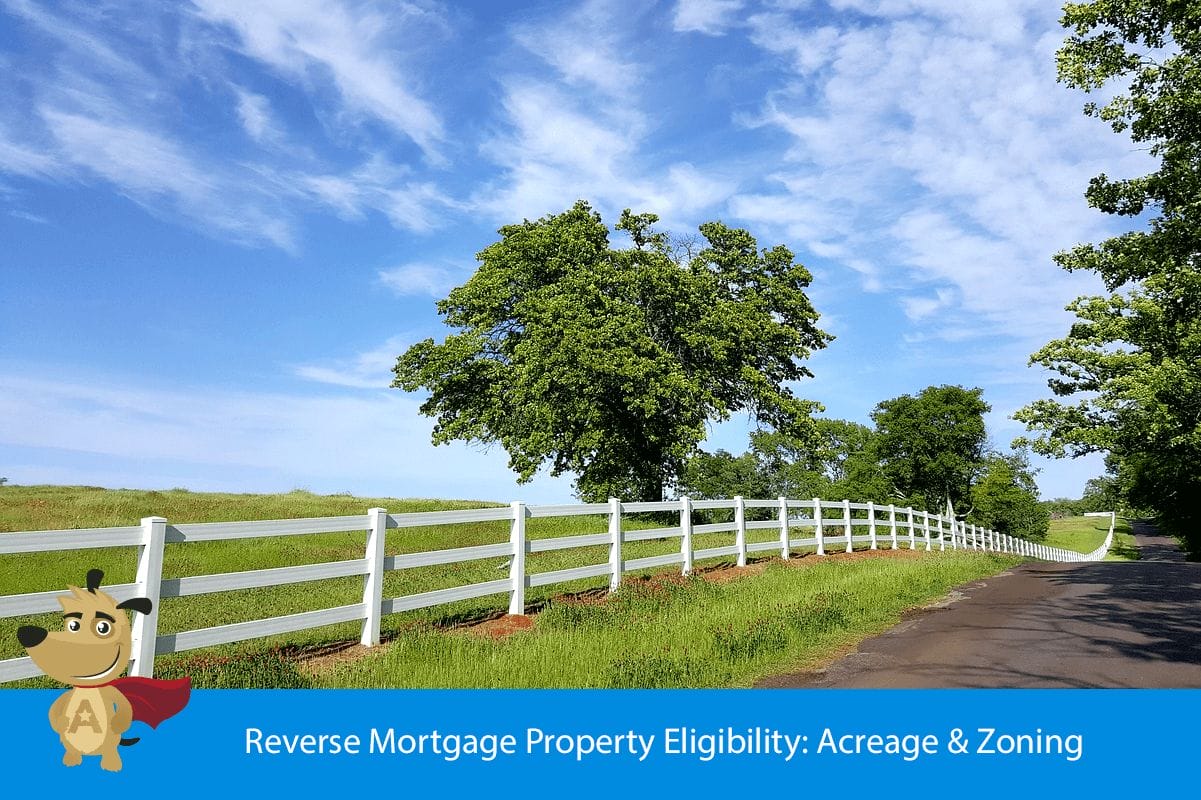
America’s #1 Rated Reverse Lender*
Reverse Mortgage Property Eligibility: Acreage & Zoning
 |
Michael G. Branson, CEO of All Reverse Mortgage, Inc., and moderator of ARLO™, has 45 years of experience in mortgage banking, with the past 20 years devoted exclusively to reverse mortgages. A Forbes Real Estate Council member, he developed the industry's first fixed-rate jumbo reverse mortgage and has been featured in Forbes, Kiplinger, the LA Times, and Yahoo Finance. (License: NMLS# 14040) |
 |
Cliff Auerswald, President of All Reverse Mortgage, Inc., and co-creator of ARLO™ — the industry's first real-time reverse mortgage pricing engine — has 27 years of experience in mortgage banking, with 20+ years focused exclusively on reverse mortgages. A recognized expert in reverse mortgage technology and consumer education, he has been featured in Kiplinger, Yahoo Finance, Realtor.com, and HousingWire. (License: NMLS# 14041) |
I will be 62, and my wife is 58. We are both retired at present. We own acreage (deed) under an LP where we are both partners and intend to build a home on it. We can pay outright for the home and own 100% equity in the house and acreage. My thought is to take a reverse mortgage to fund the next 5-10 years of living expenses while delaying IRA withdrawal and letting it grow and also delay SS until full benefit or wait until 70 to collect. If the LP acreage that the house will be on is considered together to utilize LP acreage equity, is this a sensible use of the reverse mortgage? – Eric

You have raised several issues that are not simple to resolve in this format. I have to start by telling you that I am not a financial planner and that I cannot give you financial advice. I can answer your questions about the reverse mortgage program. Still, to determine whether or not the reverse mortgage is a “sensible use” of the acreage in your circumstance, I would direct you to a financial expert in your area or one who knows your finances and goals.
With regard to the loan itself, you must transfer the property into your name as an individual (your wife, being under 62, would have to come off of the title and would be a non-borrowing spouse) if you wish to do the loan.
The loan must encumber just one parcel; it cannot cross-collateralize multiple parcels of land. Therefore, if the acreage that you reference is part of the same legal parcel on which the improved home is situated, then yes, that value will be considered – but the appraiser will have to be able to find other sales of similar properties when doing the appraisal.
You don’t indicate the amount of the acreage, but for argument’s sake, let’s call it 5 acres of land with a pad suitable for building. If the 5 acres is a separate legal parcel, it would not be considered in the value and would not be encumbered by the loan. If the 5 acres were all part of the same legal description, it would also be encumbered with the reverse mortgage, but the appraiser would have to be able to find similar sales with 5-acre parcels to determine the value of the lot.
Larger parcels of land begin to get a bit touchy. If the land is zoned agricultural or commercial or deemed that the value is all in the land and not as a residential property, then it may not even qualify for HUD insurance and, therefore, would not be eligible for the reverse mortgage program.
Some borrowers do a lot adjustment before they ever start their reverse mortgage to keep the actual parcel for the home down to the same size as other homes in the area so that they will not lose the value of the excess land that the appraiser could not use.
Before doing anything like that, you would want to verify local sales and zoning ordinances to ensure that you were not incurring unnecessary expenses that did not improve your position. I know this may not give you the answers you seek, but I would rather give you an idea of the things you need to research than give you a short and quick answer that leads you to the wrong conclusions.
ARLO recommends these helpful resources:

 Michael G. Branson
Michael G. Branson Cliff Auerswald
Cliff Auerswald

July 25th, 2023
July 25th, 2023
May 23rd, 2023
May 23rd, 2023
December 20th, 2022
December 20th, 2022
May 23rd, 2022
May 23rd, 2022
August 19th, 2020
August 19th, 2020
October 23rd, 2019
October 23rd, 2019
July 23rd, 2019
July 23rd, 2019
June 19th, 2017
June 19th, 2017
October 10th, 2016
October 10th, 2016